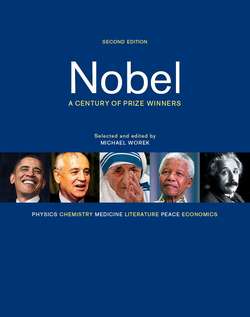Читать книгу Nobel - Michael Worek - Страница 41
На сайте Литреса книга снята с продажи.
ОглавлениеRabindranath Tagore (1861–1941)
1913 Literature
Because of his profoundly sensitive, fresh and beautiful verse, by which, with consummate skill, he has made his poetic thought, expressed in his own English words, a part of the literature of the West.
Ravindranatha Thakur, under the pseudonym of Rabindranath Tagore, became for the world, but particularly India, a leading spiritual voice — even his physical appearance and demeanor seemed reminiscent of a prophet. Tagore was born into a large, distinguished family. He was the son of Maharishi Debendranath Tagore, leader of the Brahmo Samaj, a new religious sect. He was the youngest of 12 brothers who would have an important role in his development, particularly the older ones, due to the frequent absences of his father. Tagore showed a strong inclination toward writing from a very young age. He was educated at home in Bengali and later took English lessons. In the breaks between lessons he read Bengali poets and wrote poetry himself.
At the age of 17 Tagore’s father gave his son the rare opportunity of studying in England and, although he returned to India without finishing his studies, he published several books of poetry, including Manasi (The Ideal One). In the following year, 1891, he went to Shilaidah and Shazadpur to run the family estate. This experience, which lasted 10 years, proved very enriching for his literary activity, since he had close contact with the poverty and inequality that inspired many of his writings. During this period he published more pieces of poetry, including Sonar Tari (The Golden Boat) in 1894, and various pieces for the stage, such as Chitrangada in 1892.
In 1901 Tagore founded an experimental school in Shantiniketan, where the best traditions of India and the West were combined. This project began on a very small scale but proved successful and, in 1921, was enlarged into a university. As well as these literary and educational activities, Tagore was also a nonprofessional politician. He participated in the Indian nationalist movement and had a firm friendship with Mahatma Gandhi.
Tagore wrote novels, tales, essays, autobiographies, dramas and theater pieces, but, above all, he was a poet with a harmonious, rhythmic style and a rare gift as a wordsmith. He wrote sensitive, beautiful poetry with technical perfection, such as the well-known Gitanjali: Song Offerings, in 1912. He was awarded the 1913 Nobel Prize in Literature.
The translation of some of Tagore’s works made it possible for his fame to spread beyond his own country. He participated in conferences, traveled and became a spokesperson for the independence of his country. He was also made a Knight of the British Empire in 1915, an honor that he denounced a few years later as a protest against English politics in India.
